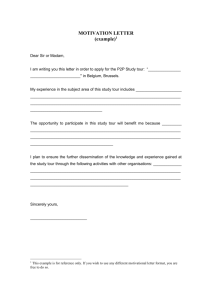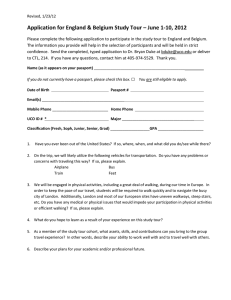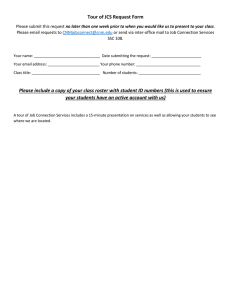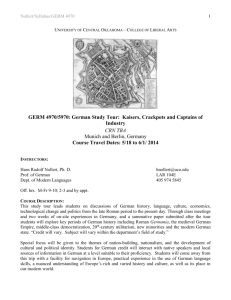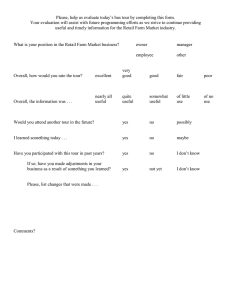GERM 4970/5970: German Study Tour: the Center of Europe CRN TBA
advertisement
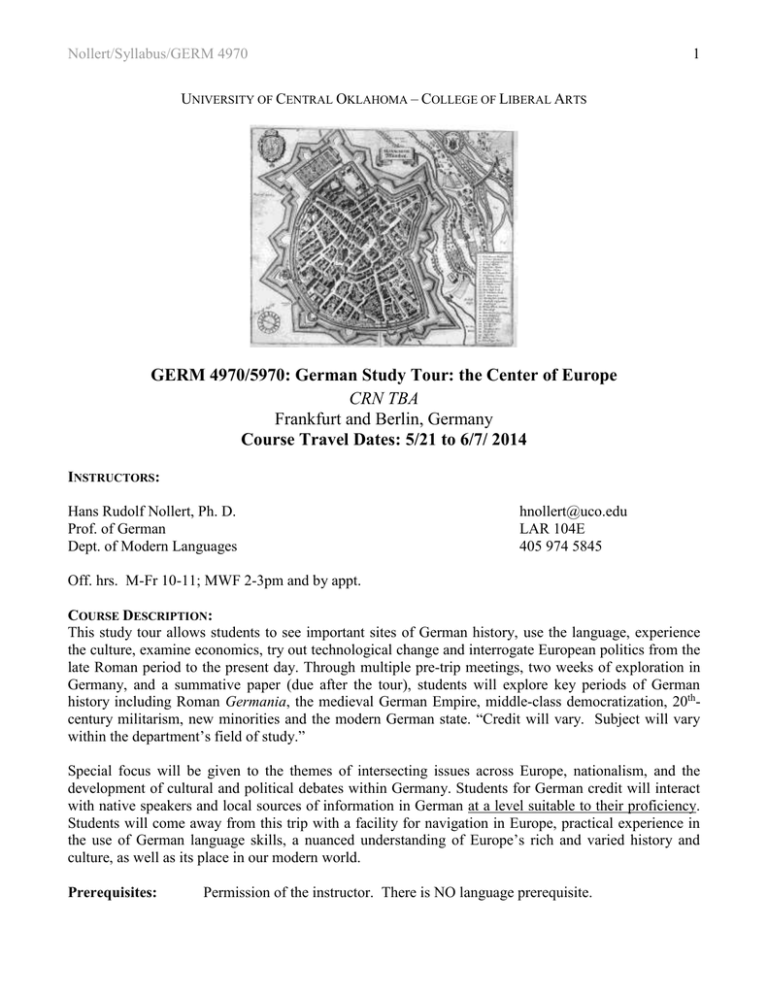
Nollert/Syllabus/GERM 4970 1 UNIVERSITY OF CENTRAL OKLAHOMA – COLLEGE OF LIBERAL ARTS GERM 4970/5970: German Study Tour: the Center of Europe CRN TBA Frankfurt and Berlin, Germany Course Travel Dates: 5/21 to 6/7/ 2014 INSTRUCTORS: Hans Rudolf Nollert, Ph. D. Prof. of German Dept. of Modern Languages hnollert@uco.edu LAR 104E 405 974 5845 Off. hrs. M-Fr 10-11; MWF 2-3pm and by appt. COURSE DESCRIPTION: This study tour allows students to see important sites of German history, use the language, experience the culture, examine economics, try out technological change and interrogate European politics from the late Roman period to the present day. Through multiple pre-trip meetings, two weeks of exploration in Germany, and a summative paper (due after the tour), students will explore key periods of German history including Roman Germania, the medieval German Empire, middle-class democratization, 20thcentury militarism, new minorities and the modern German state. “Credit will vary. Subject will vary within the department’s field of study.” Special focus will be given to the themes of intersecting issues across Europe, nationalism, and the development of cultural and political debates within Germany. Students for German credit will interact with native speakers and local sources of information in German at a level suitable to their proficiency. Students will come away from this trip with a facility for navigation in Europe, practical experience in the use of German language skills, a nuanced understanding of Europe’s rich and varied history and culture, as well as its place in our modern world. Prerequisites: Permission of the instructor. There is NO language prerequisite. Nollert/Syllabus/GERM 4970 2 REQUIRED READINGS, VIEWINGS, AND REVIEWS: • Excerpts from Tacitus Germania, Benjamin’s One-Way Street; Luther’s Address to the Christian Nobility of the German Nation; a German history overview • Entire text of a selected poem; a short story from German literature; Celan’s Death Fugue; Timothy Garton Ash on the Fall of the Wall • The films “Der Golem”, “One, Two, Three” “The Lives of Others” or “Goodbye, Lenin” • The sites, routes, and features designated in the map list • A selection of artworks from artists listed on the culture list. • Guidebooks for Germany and Berlin • DK Eyewitness Travel Berlin, (2011), ISBN-13: 978-1465400475 • DK Eyewitness Travel: Germany (2014), ISBN-13 978-1465411525 Course materials: Bound or paper journal (provided); Camera; possibly a netbook, notebook, laptop or tablet pc; a sturdy bag—like a messenger bag for carrying items through the day. We do insist that students travel to Europe with one carry-on bag, in order to make sure the luggage arrives with us and to facilitate moving to the hotel in the city. COURSE OBJECTIVES: Through this intensive two-week study tour and its preparatory work, students will: • explore Germany’s history from the late Roman period to the modern era; • learn about key figures and events in the country’s history; • examine key themes including the development of identity, nationalism, and Germany’s role in Europe and the world. • Use their German language skills to negotiate transit systems, shop for groceries shopping, and share information with their non-German-speaking fellow students. EXPECTATION OF STUDENTS: Students enrolled in the course are expected: • to attend all class meetings held at UCO during Spring Semester in preparation for the trip to Germany; • to read all assigned readings by the deadlines indicated by the course instructors; • to complete all writing assignments and exams on time; • to make an on-site presentation about a German cultural or historical figure or topic; • to use their German skills (at whatever level is suitable for the student) for communicative success; • and to behave in a professional and responsible manner. TRANSFORMATIVE LEARNING OBJECTIVES: The tour addresses Global Competency through student travel to Germany and navigation both physically and culturally onsite. The students who undertake the ‘directed learning day” will develop and display Leadership skills through their collaborative planning of such an enterprise. Health and Wellness are not directly addressed, although the significant walking and use of public transportation should have positive side effects besides simple transportation. Nollert/Syllabus/GERM 4970 3 The preparatory readings, the experiences in Germany and map work will impart Discipline Knowledge to the students. Each student will Research the topic of his or her presentation subject. There is no formal Service component. COURSE ASSESSMENT: Course grades will be calculated based on the following: • • • • • • • Pre-trip Test On-Site Report o Oral Report o Site Brochure Daily Journal Cultural “Scavenger Hunt” Oral discussion Map Quiz Final Written Report 10% 20% 10% 20% 5% 5% 10% 20% Grading scale: 90-100% = A; 80-89% = B; 70-79% = B; 60-69% = D; <60% = F GUIDELINES FOR ORAL REPORTS: Each student is required to give one oral report lasting about 10 minutes. Report topics will be selected during the Spring Semester and all research, preparation and printing of materials should be completed before departing. Presentations will be made during on-site visits in Germany. The following rules should be observed regarding the reports. • Each student is to sign up for one report during Spring Semester. • The reports should be about ten minutes long. • Students should complete the research and writing of their reports before leaving for Europe. Once we depart Oklahoma, you will not have much time to work on the presentation. Finding copying facilities can also be difficult on site. Your materials should be ready before departure for Germany. • The report should contain the following five elements. 1. An overview: Provide a description of the person or place. For people, this should include a discussion of when he/she lived, what he/she did, and why this person is important. For buildings, parks, and objects, the presentation should discuss what it is, who built/created it, when, why, what purpose it served, and what purpose it serves today. 2. Significance: Presenters must discuss why they think this person, place or object is significant. 3. Theme: Structure the report to have thesis. 4. Course Theme: Relate this person or place to the course theme “Germany: the Center of Europe”. Name the era of the person or place. Does the topic bridge more than one period? Did it leave a lasting impact on successive eras? 5. Handout: You must prepare a handout to pass out to the class at the time of your presentation. These brochures will serve as a study guide for the other students, so you Nollert/Syllabus/GERM 4970 4 should keep this in mind when preparing your handout. The brochures must be a onepage, double-sided brochure. Paper size should be Letter (8.5x11 in.). The handout must include the following elements: your name, course number, and date of presentation; a clear and coherent synopsis of the information in your presentation; and visual aids (drawings, pictures, or graphs to support your presentation). GUIDELINES FOR JOURNALS: The following guidelines should be followed when writing your daily journals. • Journal entries must be hand-written in the book provided. (Please write legibly!) • If a worksheet has been provided for a site, use it to guide your commentary. • You should make at least one journal entry for each day. Include the date with each entry. • Open (no worksheet) entries should include the following: o an account of the sites visited and your reaction to them; o a description of side trips that you made during your free time; o a list of new German vocabulary or a language aspect (use of subjunctive for polite requests, for example) for that day; o a discussion of how these trips relate to the class theme (“Center of Europe”) o an explicit connection to an earlier insight, lesson or site visit; o and your specific reaction to what you experienced that day. What new things did you see or experience? What new foods did you try? Was there anything unexpected? What sights, sounds, smells, etc. left an impression on you? What did you like/not like? For Art museums—name a picture, perhaps provide a postcard of it and write about what motivated your choice. For historical museums—select an exhibit or artifact, provide a picture, postcard or description of it and describe the historical or cultural insight provided through this item. • Journals must also include the brochures from all on-site reports. • Completed journals are to be turned in to your instructor at the end of each week. (See schedule below.) ORAL EXAMS: The group will gather for a summative discussion at the end of each week in Europe. These will account for 50% of your oral grade. The other half of the the “oral” credit will come from 3 required verbal exchanges of information with German speakers in Germany. These will be functional exchanges with people in Frankfurt, Leipzig, Berlin, or our other sites. GUIDELINES FOR FINAL REPORT: All students are required to submit a final report by July 10, 2015 or two weeks after the individual’s return to the US (whichever is later). The final report should answer the following question: How do two of the sites visited illustrate the the centrality of Germany to the notion or experience of Europe and how do they prompt your reflections? Nollert/Syllabus/GERM 4970 5 Your undergraduate written paper should be double-spaced, paginated, and 8-10 pages in length (without a cover page). Formal citations are not required, but appreciated. (Graduate student papers take the form of a longer description raisonnee of a two-week study tour planned by the student.) Times New Roman (12-point) or similar font should be used, and page margins are not to exceed 1 inch. You must include photos taken on the trip to illustrate your arguments in the paper. These photos should either be in a PowerPoint slideshow or accompany the report as an appendix. Pictures are not counted in the page length. Guidelines for Cultural Scavenger Hunt Note the date, time and identify the item for each instance. A digital photograph could be added to the file, as well. The scavenger hunt should prompt observations in your journal, so it is expected that items would appear in both documents. SCHEDULE: Spring Semester The class will meet at UCO on the following dates. All meetings will take place on Friday afternoons from 4:00-5:30 p.m. unless otherwise indicated. The location is to be announced—most likely LAR 223. Please note that attendance at these meetings is required for trip preparation. Friday 2/20 Course Introduction: Orientation meeting (distribute syllabus w/ suggested topics list and dramatis personae); passport check. Friday 3/6 German History – From Rome to the Holy Roman Empire Maps, foot and air travel (a presentation from a previous traveller), report topics overview. Western Germany’s older history. Friday 3/27 Modern German History Berlin in German history; report selections; W. Benjamin on walking in Berlin, Navigating in Berlin, The Fall of the Wall, Timothy Garton Ash and the Fall of the Wall Friday 4/17 Student Conduct Meeting, Travel specifics--packing Student Conduct Meeting, packing a roll-on bag for two weeks Friday 5/15 Modern Berlin; Map Quiz; If possible: Film Night Nollert/Syllabus/GERM 4970 6 Financial information Course Cost: The study tour course costs $3150 per student, which covers airfare, lodging, breakfasts, ground transportation, site admissions, and materials. Our lodging will include both breakfast and dinner. Costs not covered include UCO tuition, most lunches and some dinners, optional travel on directed learning days, luggage, cameras, passport fee, souvenirs, and travel insurance (available from the UCO Centre for Global Competency through an International Student ID Card or a comparable travel insurance designated by the tour leaders. Payments towards the tour are made at the UCO Bursar’s window. Students must be careful to have payments credited to the correct German Tour org number (provided by the instructor) and must bring a receipt to the instructor. Deposit: Students wishing to enroll in this course must fill out the study tour application and pay a $500.00 deposit by Friday, 1 March 2015 to reserve their spot in the class. A payment schedule is set up below for the balance. The instructor will have to make non-refundable purchases for students, specifically air tickets and hotel bookings, in order to obtain the most affordable prices. Once made, the non-refundable purchases cannot be refunded if a student drops the class. The instructor will alert students to these purchases before making them and require the students to sign a statement of understanding. The only possibility for a refund under these circumstances is if the student dropping is replaced by another student signing up. All students will be candidates for $1000 Liberal Arts Study Tour Scholarships as well as $750 UCO Foundation Scholarships. You will receive word of your award as quickly as possible. Other scholarships and awards are available through UCO and area organizations. Financial Aid: Students paying for the course with financial aid must pay $1500.00 of the trip costs by 1 April 2015. The tour must have cash on hand by that date to book airline tickets and to reserve hotels. Financial aid money will probably not be disbursed until June. Please consult with your financial aid counselor if you wish to use financial aid to pay for this class. Summer Semester You will be issued a reading packet containing journal articles related to our site visits. I recommend you complete the readings before we depart for Germany. These assigned articles include important information to prepare you for our site visits and we will discuss them during our discussion group meetings. The itinerary is subject to change in the best interests of the academic purposes of the tour and the safety of the travellers (due to causes such as disrupted transportation, currency fluctuations and matters of public safety, for example). OKC 21 May, Thursday Depart OKC for Frankfurt FRANKFURT (7 nights) 22 May, Friday Arrive Frankfurt. Jugendherberge Bad Homburg. Homburg Stadtbummel with group meal. 23 May, Saturday Frankfurt. Early afternoon: Staedel Art Museum; Apfelweinlokal (Wagner or Gemaltes Haus). Stadtbummel (Römer etc.) 24 May, Sunday Hessenpark. Bauernmarkt oder Handwerkertag. Picnic on grounds with bread, cheese, wurst and cake from park shops. Nollert/Syllabus/GERM 4970 7 25 May, Monday Marksburg Castle on the Rhein (open Mondays). Rheinland-Pfalz Länderticket. 45 minute hike on the Burgenlehrpfad between Schloss Phillipsburg in Braubach and the Marksburg. Ferry at Goarshausen. Burg Rheinfels. Plan for picnic. 26 May, Tuesday Seligenstadt. Tours of Carolingian to Baroque Monastery. Picnic lunch. Glaabsbräu Classic tour. 27 May, Wednesday Mainz: Cathedral and Gutenberg Museum. Picnic lunch. 28 May, Thursday Roman Saalburg. Roman foods in the taberna. LEIPZIG (2 nights) 29 May, Friday Train to Leipzig. Jugendherberge Bahnhof. Leipzig BMW factory tour 15:00. 2.5 hours. Evening: Joh. S. Bach’s Thomaskirche, Stadtbummel. 30 May, Saturday Leipzig: Nikolaikirche, Bachmuseum, Stasi-Museum, Museum der Bildenden Künste. 31 May, Sunday Leipzig Mendelssohn-Haus Sunday morning concert 11:00. Afterward guided tour. Food from train station. Train or bus to Berlin; Jugendherberge Wannsee. BERLIN (6 nights) 1 June, Monday Sachsenhausen Concentration camp guided tour. Evening: Reichstag (Sony Center?) 2 June, Tuesday Jewish Museum guided tour MPB. Brauhaus Mitte (if near museum) Afternoon: Pergamonmuseum or MPB. 3 June, Wednesday Train or bus to Wittenberg. Lutherhaus 9:00 Guided Tour . Cranachhaus. Piesteritzer Werksiedlung. Back to Berlin. Jugendherberge. 4 June, Thursday Neue Nationalgalerie MPB (Might organize Komische Oper tour—our request-and 19:30 performance of Monteverdi’s Odysseus here) 5 June, Friday Potsdam. Sanssouci Palace and Chinese House. Komische Oper Backstage Tour 16:00-17:15 pm. Performance Bizet’s “Carmen” 19:30 6 June, Saturday DIRECTED LEARNING DAY. Abschiedsfeier Hasir 7 June, Sunday Depart for OKC July 10 Final class meeting. LAR 223 6:00 to 9:00 p.m. Final reports due no later than July 10. E-mail to your instructor(s) or use Dropbox on D2L. Report topics for German: Frankfurt: Kelten, Gothen, Römer, Türken; Jüdische Gemeinde von München; the Holy Roman Empire; Joh. Wolfgang von Goethe; Monastic life; Scientists; Heinrich Hofmann; Beer production; Musik; Religious architecture; French gardens; English gardens; Gothic, Romanesque; Baroque architecture; Gutenberg; Wine; Castle life Berlin: Daniel Chodowiecki; Moses Mendelssohn; Caspar David Friedrich; Karl Friedrich Schinkel; Lucas Cranach; Friedrich der Weise; Friedrich der Große; Martin Luther; Phillip Melanchton; Johannes Tetzel; Modern architecture—Bruno Taut, Walter Gropius; Walter Benjamin (Berlin Childhood around 1900); Bertolt Brecht; East Germany; the Stasi (Staatssicherheit); Berliner Philharmoniker; Berliner Staatsoper; Konzerte... Nollert/Syllabus/GERM 4970 8 Speaking opportunities: Bäckerei/Konditorei; Eisdiele/ Gelateria; Metzgerei; Lebensmittelgeschäft (ReWe, Aldi, etc.); Kaufhaus; Kiosk; die Post; Saturn (Elektronik—Handy-Kauf); Bahnkarten; Bahn- oder Busroute; Eintrittskarten; etc. Academic Affairs standard academic policies sheet: http://www.uco.edu/academic-affairs/files/studentinfosheetfal12.pdf (The link is for Fall 2012 and will be updated for the appropriate semester). ADA compliance: Please be aware that the nature of international travel means that we will be outside of US legal jurisdiction and cultural practice. Accommodations cannot be made for all disabilities. Accommodations which you might expect in the United States of America are not necessarily available in other countries. Some mental disorders, such as agoraphobia, can leave a traveler frozen in fear in crowded urban situations, such as public transport in Asia or Europe. Restrooms may only be accessible via narrow stairways, which might be difficult for the physically disabled. And some medications may not be legal in other countries. Full and timely pre-trip disclosure to the professor, while the student can still make some choices about proceeding with the tour, is recommended for your safety and the tour’s best interest. Plagiarism: All papers, brochures and other student-authored work will be subject to submission to www.turnitin.com for review. Student Conduct and Withdrawal from Course: Student travellers are expected to comport themselves in a manner that reflects well upon UCO (and future study tours), allows the student the rest and composure to succeed academically (awake and ontime) and respects the the needs of other members of the tour group. A student who cannot comply with this requirement (examples might be: tardiness for group activities, inappropriate behavior towards fellow travellers, tour leaders, or personnel at visited sites, abuse or destruction of property, or criminal activity, such as theft, or the use of controlled substances) may be separated from the tour-preferably by prompt return travel to Oklahoma charged to the student’s Bursar’s account and expense. Disciplinary action for student misconduct will likely follow. STUDENTS MAY NOT WITHDRAW FROM THE COURSE ONCE TRAVEL HAS BEGUN. Some travellers may make plans to continue their travels in Europe after the tour group returns to Oklahoma. The tour leaders must know of these plans in order to make sure common group travel plans for departure will not be affected. Sometimes we can advise you about your post-trip travel plans. Nollert/Syllabus/GERM 4970 9 GERM 4970/5970: Germany: the Center of Europe Directed Learning Day worksheet. Please submit this worksheet before departure for Europe! Names of travellers: ___________________ ________________________ ___________________ ________________________ ___________________ ________________________ ___________________ ________________________ Destination: ______________________________ How will you travel there and back? Please give departure and arrival times, train or bus numbers, and other itinerary information. _________________________________________________________________ ________________________________________________________________ ________________________________________________________________ What will you do at the site(s)? _________________________________________________________________ ________________________________________________________________ ________________________________________________________________ You understand that you should travel safely, by public transportation, and on a schedule that will return you to the group in Frankfurt or Berlin for safe and timely continuation of the group’s activities. You will notify the tour leaders of your safe return to the hotel in Vienna/Berlin. If you have a cell phone which functions in Europe, the number is: ___________________________ . The group leaders’ cell numbers are: Dr. Nollert _________________________________ Dr. Springer ____________________________________ Dr. Brodnax ____________________________________ Signed: ________________________________________ Date: ________________
